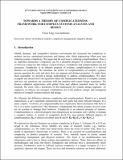Towards a Theory of Complicatedness: Framework for Complex Systems Analysis and Design
Author(s)
Tang, Victor; Salminen, Vesa
DownloadTang-Salminen_Towards_WkgPpr_Aug01.pdf (245.6Kb)
Metadata
Show full item recordAbstract
Global, dynamic, and competitive business environment has increased the complexity in
product, service, operational processes and human side. Much engineering effort goes into
reducing systems complexity. We argue that the real issue is reducing complicatedness. This is
an important distinction. Complexity can be a desirable property of systems provided it is
architected complexity that reduces complicatedness. Complexity and complicatedness are not synonyms. Complexity is an inherent property of systems; complicatedness is a derived
function of complexity. We introduce the notion of complicatedness of complex systems,
present equations for each and show they are separate and distinct properties. To make these
ideas actionable, we present a design methodology to address complicatedness. We show
examples and discuss how our equations reflect the fundamental behavior of complex systems
and how our equations are consistent with our intuition and system design experience. We
discuss validation experiments with global firms and address potential areas for further
research. We close with a discussion of the implications for systems design engineers. As
engineers, we believe our strongest contributions are to the analysis, design, and managerial
practice of complex systems analysis and design.
We illustrate the difference between complexity and complicatedness. Relative to a manual
transmission, a car’s automatic transmission has more parts and more intricate linkages. It is
more complex. To drivers, it is unquestionably less complicated, but to mechanics who have to
fix it, it is more complicated. This illustrates a fundamental fact about systems; decision units
act on systems to manage their behavior. Complexity is an inherent property of systems.
Complicatedness is a derived property that characterizes an execution unit’s ability to manage
a complex system. A system of complexity level, Ca, may present different degrees of
complicatedness, K, to distinct execution units E and F; KE=KE(Ca) ≠KF=KF(Ca).
We summarize relevant literature on systems complexity in Figure 1. Columns [1] to [15] are
keyed to the references. Rows identify key areas of research results; e.g., metrics,
complicatedness, etc. We make four observations about the locus of results. One, there is a
dearth of quantitative frameworks or metrics. There is no research on complicatedness and
complexity as distinct properties of systems. Two, research seems to cluster around
engineering management and physical products. The focus is on modularization and
interactions with a bias to linear systems and qualitative metrics. Three, there are efforts on
methodologies and tools, but theory, foundations and software have a demonstrably lesser
presence. Ferdinand’s work in software systems complexity is a happy exception [1]. It is
analytical, rigorous and elegant. Three, services and enterprise solutions are barely addressed.
This is a serious omission given the high proportion of services in industrialized economies.
Fourth, although layering of abstract systems and reintegration have a long history; the
literature is skewed to decomposition rather than integration.
Description
To be presented at the 13 th International Conference on Engineering Design, Glasgow, Scotland, August 2001.
Date issued
2001-08Keywords
theory or technical systems, complexity management, adaptive design, complexity, complex systems, systems engineering